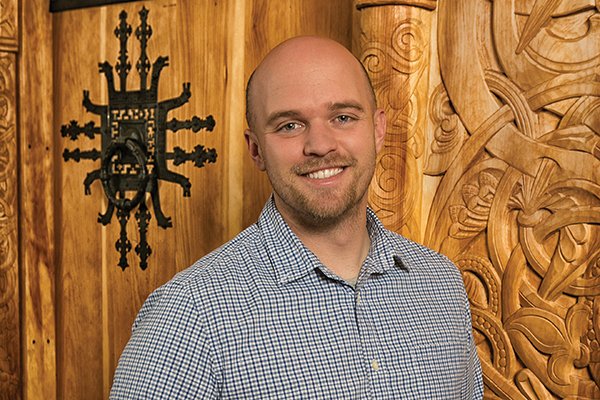Tales of gore
Assistant professor of history Sam Claussen's new course on Vikings asks how a small population terrorized northern Europe and then embraced the conquered people's cultures.
Do you have any favorite Viking stories?
I was skeptical of the History Channel from day one, but the TV show Vikings actually turned out pretty good. I’d recommend it. Basically, it follows the life of this man named Ragnar Lothbrok. He is legendary; we don’t know if he ever existed.
Anyway, after many years of attacking England, he’s captured in battle by the king of Northumbria. The king has a nasty attitude and puts Ragnar in a pit of vipers that devour him. The famous line that Ragnar yells out as he’s dying is, My, how the piglets will grunt when they hear how the old boar suffered.
That’s when we shift from the legendary into the historical, because what happens is that Ragnar’s sons – if we believe they are – form what’s called the Great Heathen Army and invade England. They destroy the king of Northumbria in a very nasty way and conquer almost all of England except for the kingdom of Essex led by Alfred the Great.
What is a Viking raid like?
A ship pulls up to the beach, they jump out, they slaughter people, they grab things, they take some people back to be slaves, and then they’re gone. That’s the terror of the Vikings: A raid is sort of a lightning war. They target monasteries because they’re wealthy, or towns.
How far did this take them?
You have raids through Italy, into Sicily, parts of North Africa. Eventually they’ll get into Russia and all the way to Byzantium. They become the elite guard of the Byzantine emperor in Constantinople, the Varangian Guard.
Their successes are really in northern Europe and Iceland. They raid through Spain and that’s where their first defeats really come. France and England aren’t ready for the Vikings raids, but the Muslim world is stronger and more powerful.
The last part is hopping over to our part of the world, settling in Greenland. Most scholars would say they got to Canada as well.
What is there to be proud of in a Viking heritage, for those who have one?
Right, as a cultural historian of violence, I talk about the brutality, but Vikings did a lot of cool things too. In Iceland, they developed law in a way that was sort of new to northern Europe. It’s not what we would recognize today as democracy, but it was a broad-based community system.
The English language is indelibly marked by Viking influence. Some of the technological and military innovations are key. Their ships not only sit high enough in the water that they can go up rivers but are also capable of sailing across the high seas. European Christians will eventually borrow that technology and Viking military techniques.
With a last name like Claussen, are you a bit of a Viking?
I joke that my dad’s side of the family was all Vikings, though we’re not sure if they came from Denmark or northern Germany. My mother’s maiden name was Fausett, which doesn’t sound Viking. But hold on, because that’s an English name that comes from French, so they came over with the Norman invasion, and the Normans themselves were Vikings. The Vikings were everywhere and probably had quite a little impact on the gene pool of northern and eastern Europe.
Are we talking about a diverse group of people?
I’m glad you asked that. One of the issues roiling medieval studies right now is the question, “Were the Middle Ages ‘white’?” The Vikings in particular are becoming a flashpoint of this debate. Most of the original Vikings were probably northern Europeans, but we have evidence from burials – where they do skeletal analysis and look at genetics – that there were Vikings from Central Asia.
Later, you get English becoming Vikings, you get Irish, you get French. When they get down into the Mediterranean, we have some evidence that some Muslims join up and that northern Africans become Vikings. The longer this period goes on and the farther the Vikings reach, the less we can think of them as this sort of pure European white race.
Are there other people in history like the Vikings?
We see this over and over again in different times and places – the Vikings, the Mongols, in some pre-Columbian American history – that you have these “barbarian” peoples who are not as advanced as settled societies and may be relatively small in number, but who put together these good armies. They don’t have written language for a long time, they’re seen as not as advanced as Christian Europe, and yet, they develop a military that can overwhelm or at least temporarily defeat it.
